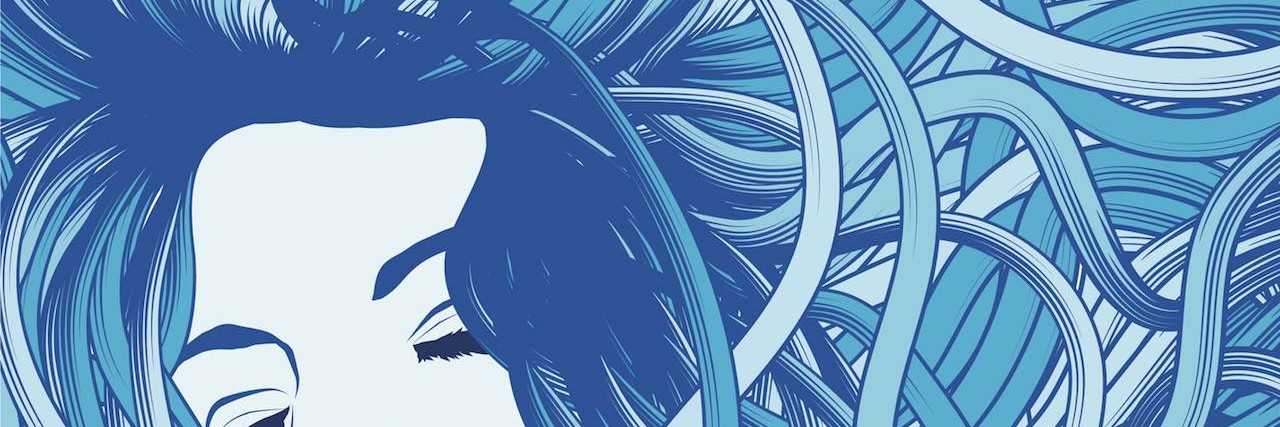When You Shrug Off Your Mental Illness Symptoms as Normal, Everyday Feelings
I was born with Generalized Anxiety Disorder, inherited from my mother. My depression started in seventh grade. I was not aware of either until my senior year of high school when I realized I wanted to die.
It was scary, terrifying actually. My depression seemed to come on suddenly, and I was left reeling in the wake of such intense feelings. At first I was in denial about it. I thought it was temporary, just a bad week. But then that week became a month, then two, then three. I’m still not sure what exactly kicked it into high gear. It could be the enormous fight with my father that changed the foundation of my life; it could also be that I was being bullied every day in school. Regardless of how it happened, I’m actually glad it did because it made me aware of my mental illnesses and started me on the path to healing.
Getting help was one of the most difficult things I’ve ever done. I stood with my mother in the kitchen for a few minutes, opening and closing my mouth until I could force out the words, “I need help.” At first, she was skeptical, and I understood why. I’ve always seemed like such a happy person, always smiling and cheerful and kind. My illnesses blindsided everyone. She only realized the severity of the situation when I said, “Mom, I want to kill myself.”
She helped me start seeing a therapist. I expected a diagnosis of depression, but I was shocked with the anxiety diagnosis. I had anxiety? How could I have not known? There were warning signs, but I’d been shrugged them off as me being shy. I was always shy as a child — I was even shy around family members, hiding behind my parents’ legs to get away from my cousins. My father would try to force me out of my shyness by making me to do things like ask for ketchup at McDonald’s by myself. That may not sound very daunting to some, but I was terrified. I thought I’d be judged for asking for ketchup. I can’t even really explain why exactly it terrified me so, but that’s anxiety for you.
I’d heard of anxiety before and wondered, “Do I have anxiety?” But I always dismissed the idea, figuring my symptoms were normal. Lots of people have a paralyzing fear of public speaking. Lots of kids are shy. I was just an introvert, I thought. I didn’t have panic attacks back then, and those seemed to me to be a key factor with anxiety disorder. Because I didn’t know about what Generalized Anxiety Disorder actually is, I didn’t know I suffered from it.
I had the same experience with my depression. My therapist and I have traced my depression all the way back to seventh grade, which shocked me. I assumed crying myself to sleep several nights a week was due to me being a teenager. It was just hormones, everyone went through it, or so I thought. She asked me if I’d ever thought about killing myself and I gave her an honest answer. I thought about what it would be like if I died — if people would miss me or not, ways I could do it, if it would hurt, what life would be like afterwards. I had those thoughts every single day for years, but I didn’t actually want to die and I didn’t have a plan, so I was fine. I was shocked when I was told those thoughts are “suicidal ideation,” a symptom of depression.
I had all of these warning signs and symptoms, but because I wasn’t informed about what depression and anxiety really are, I shrugged it off as being a normal kid. If I’d known about it sooner I could’ve gotten treatment sooner. I could’ve gotten my motivation back and done a lot better in school. I could’ve possibly kept myself from being hospitalized.
My diagnosis was recently changed to add bipolar I disorder and Borderline Personality Disorder (BPD) to the mix. It was like my first diagnosis all over again — signs I hadn’t known to look for because I wasn’t educated on the subject now seem obvious to me.
I have learned it is vital to never shrug off your feelings. Even if it seems “normal,” if it is a problem you should do thorough research. To all of you out there, I’d like to beg this of you: Educate yourself. No, I’m not saying you should become a hypochondriac and obsess over everything, but please educate yourselves. Look into all your possible symptoms, talk to someone about them. If you get the feeling that something is wrong, do not ignore it. You could save yourself a lot of strife by just being aware of yourself.
Good luck on your journey.
If you or someone you know needs help, please visit the National Suicide Prevention Lifeline. You can also reach the Crisis Text Line by texting “START” to 741-741. Head here for a list of crisis centers around the world.
The Crisis Text Line is looking for volunteers! If you’re interesting in becoming a Crisis Counselor, you can learn more information here.

